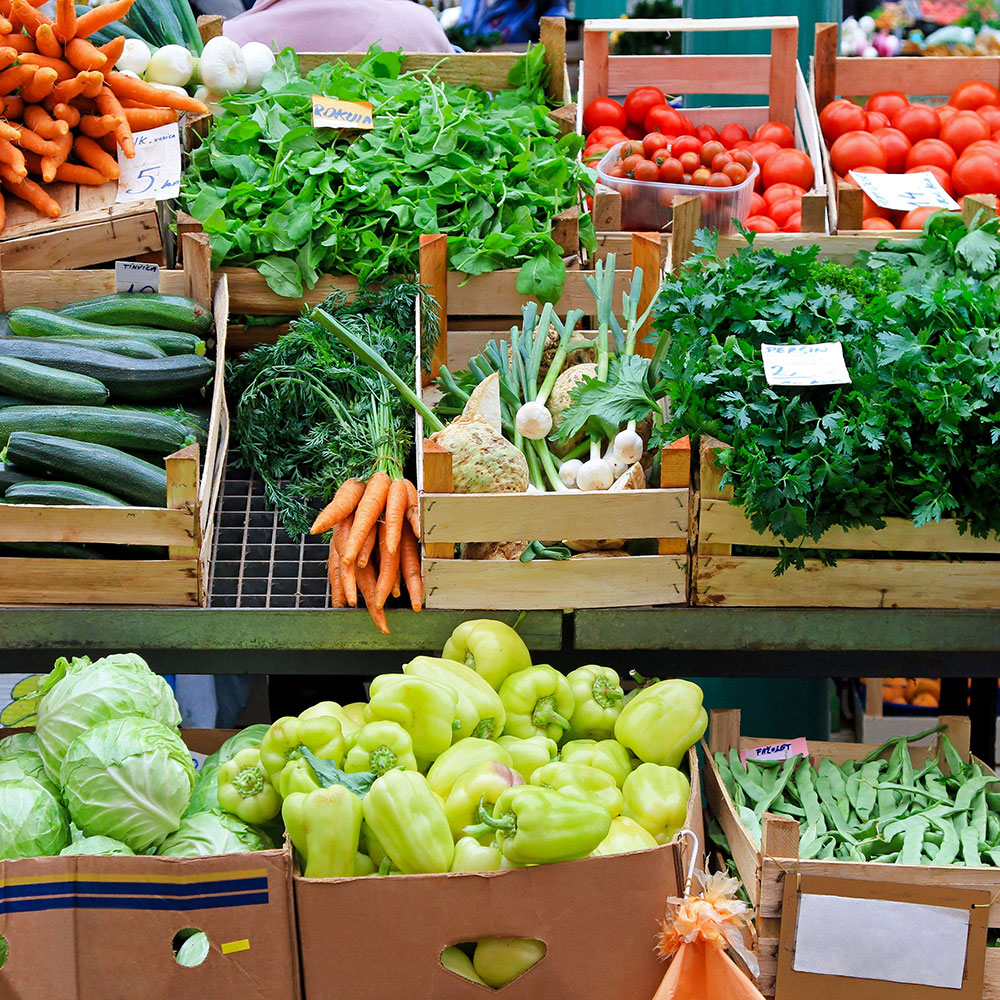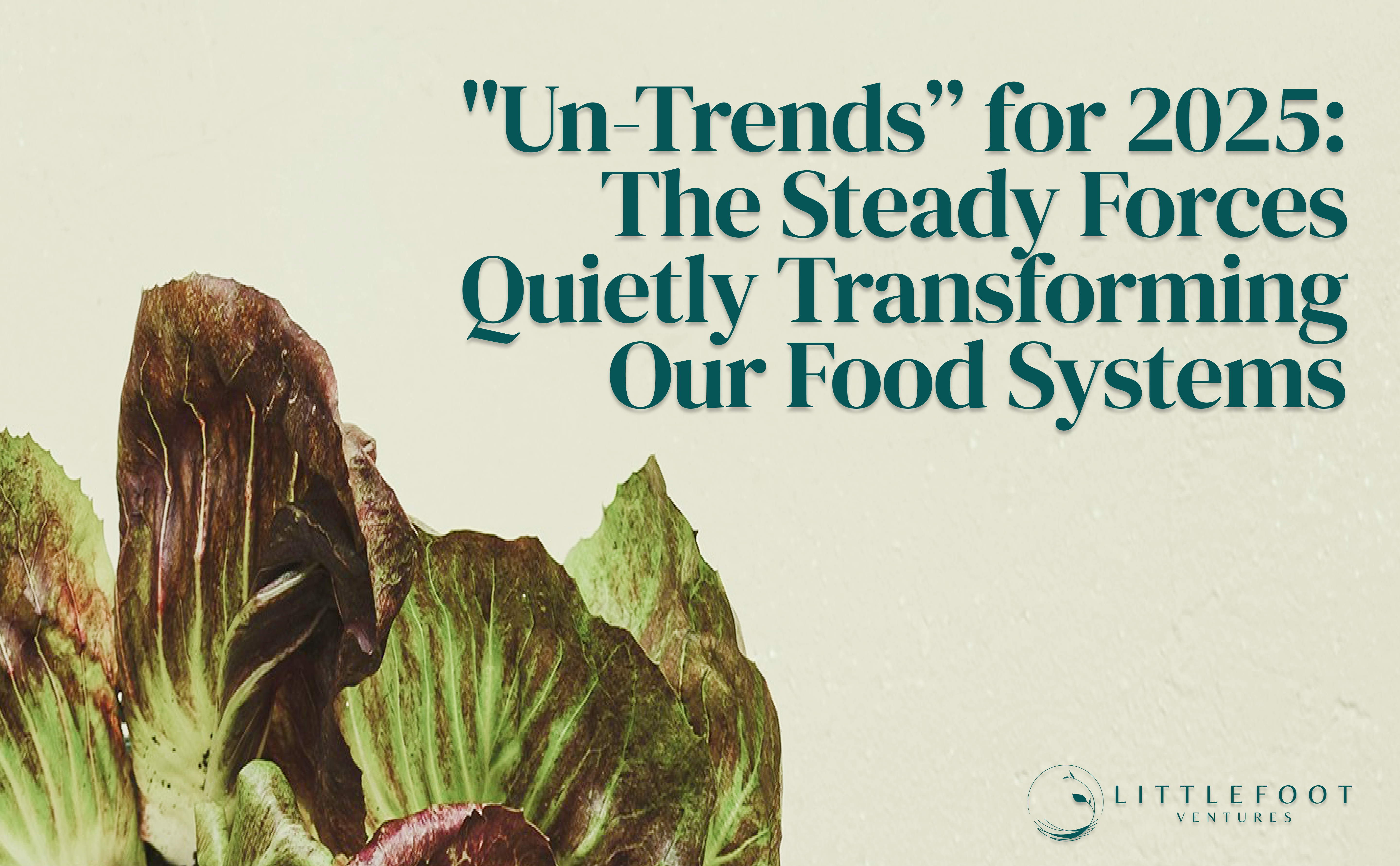Dear Colleagues,
Instead of joining the crowd of shiny 2025 trend predictions, I’m highlighting what I call the “un-trends“—the steady, less glamorous efforts driving real progress in transforming our food systems. Although not new or flashy, these foundational actions are crucial for long-term transformation in the food system and are where the real progress is happening.
Here are my top “un-trends” in food waste, regenerative agriculture, investment, corporate sustainability reporting, and philanthropy—backed by data and grounded in reality:
1. Food Waste: Address The Hidden Methane Challenge
Food waste is one of the most effective climate solutions to help limit global warming to 2°C. Yet, the U.S. generates 149 kg of food waste per capita annually—double the federal target of 74 kg. This waste contributes 14% of the U.S.’s methane emissions each year, equivalent to 75 million cars (ReFED). Methane is a potent greenhouse gas at least 28 times more effective than CO2 at trapping heat in the atmosphere over a 100-year period (EPA). Tackling household waste alone could prevent 463,000 metric tons of methane annually, but achieving this requires a multifaceted approach: consumer behavior change, robust organic diversion infrastructure, and prevention incentives to reduce waste at the source.
2. Accelerate Investment in Regenerative Agriculture
Regenerative agriculture practices like adoption of no-till and cover cropping on U.S. corn and soy farms could yield up to $250 billion in economic value over a decade, while simultaneously building soil health, sequestering carbon, and reducing input costs. However, scaling these efforts requires technical support and significant upfront investments of up to $200 per acre (McKinsey & Company). Multi-source financing is key to scaling these efforts.
3. Drive Climate Action Beyond Commitments
Only 7% of companies are currently on track to meet their net-zero pledges by 2050 (Net Zero Tracker). Compounding this challenge, all six major U.S. banks have withdrawn from the global banking industry’s net-zero target-setting group, citing concerns about political backlash against climate action, particularly with the upcoming inauguration of Donald Trump as president. These developments underscore the urgency of progress, which demands a dual focus: celebrating small wins to maintain momentum while driving ambitious, incremental actions to achieve long-term climate goals.
4. Embrace Adaptive Philanthropy and Blended Finance Models
Foundation funding for climate mitigation tripled from $1.7B in 2019 to $4.8B in 2023, yet only 1.5% went to sustainable food systems (Global Alliance for the Future of Food & ClimateWorks). Adaptive philanthropy paired with blended finance models can unlock solutions for food systems transformation.
5. Keep Farmers at the Center of Food Systems
Farmers and Indigenous Peoples are critical for building resilience, but receive less than 3% of public climate finance for food systems transformation (Global Alliance for the Future of Food). Inclusion and equity must move from buzzwords to action.
6. Consumer-Led Accountability: Drive Market Shifts
76% of grocery shoppers value transparency, and 62% are willing to pay more for products that address food waste (FMI). Consumers are increasingly shaping the market, demanding ethical practices, and holding corporations accountable through purchasing power. They need accessible, sustainable options tailored to their needs.
7. Invest in Food Systems: From Margins to Mainstream
Only 2.5% of public climate finance flows to food systems transformation (ClimateWorks). Redirecting finance into sustainable agriculture, smallholder resilience, and regenerative practices will unlock transformational impacts, especially in underserved regions.
8. Go Full Ham on Corporate ESG Reporting
Transparency matters—76% of shoppers prioritize corporate sustainability practices (FMI). Accurate Scope 3 emissions reporting and transparent supply chain data are critical for earning trust and meeting rising consumer expectations. With disclosure regulations already taking hold in the EU and California, now is the time to act. Don’t wait for it to become mandatory.
9. Collaborative Innovation: Scale Technologies that Work
Climate-related agri-foodtech funding reached $2.7 billion in 2023, focusing on farm-level solutions (AgFunder). Investing in tech innovations like precision agriculture, soil sensors, and low-carbon food production will accelerate adoption of sustainable practices.
10. Lean Into Multi-Stakeholder Collaboration
Harmonized efforts across public, private, and nonprofit sectors are essential to scaling climate-positive solutions. If you’re not sure on where to start or are looking to amplify existing efforts, contact me at Littlefoot Ventures.
What other “un-trends” do you think are shaping food systems in 2025? Share your thoughts with us on LinkedIn.
Eva Goulbourne
Founder & CEO, Littlefoot Ventures
The Pulse @ Littlefoot Ventures
- 🌍💡🌱 Littlefoot Goes To Davos: Grateful and thrilled to share that I’ll be returning to Davos, 10 years after my time at World Economic Forum. It’s a full-circle moment, and I couldn’t be more excited to connect with inspiring leaders, exchange ideas, and gain new insights. This year, I’m focused on food waste reduction and regenerative agriculture, exploring how we can close funding gaps and scale solutions for a more sustainable future. If you’re attending or know of opportunities to connect with like-minded change makers, please reach out (eva@littlefootventures.com)—I’d love to meet! I’ll be soaking in all the wisdom and promise to bring actionable insights back down the mountain to share with the Littlefoot community and integrate into our work.
- 💸🗣️ Unlock the Power of Climate Messaging: In 2024, we proudly delivered our Climate Messaging Mastery Course to 27 organizations across the globe—spanning the USA, Latin America, Europe, East Africa, and Southeast Asia. This course enhanced the participating nonprofits’ ability to communicate climate and social impact, opening doors to the over $3.7B+ in annual philanthropic climate funding. Our next cohort is launching soon. Sign up here for more info and get ready to amplify your impact!
Regenerative Ag Survey
As COP 30 in Brazil approaches, we’re seeking valuable insights from funders and advisors to help shape the future of regenerative agriculture funding. We need your input to identify critical investment gaps and opportunities that can drive meaningful climate and food system transformation. Please take a few minutes to complete our Regenerative Investment Survey by January 31, 2025.
Insights for Impact: Our Top Reads
Check out some of the articles that our team has been reading and loving lately.
Looking Ahead: Our 2025 Food Waste Forecast
ReFED
Explore ReFED’s insights on the top food waste trends to watch in 2025, from policy shifts and emerging data to the unexpected influence of GLP-1 medications. This comprehensive analysis highlights opportunities for progress in reducing food waste, addressing high food prices, and leveraging technology and policy innovations.
New Agriculture Supply Chain Infrastructure Map Unlocks Opportunities for Future Investment
Regenerative Food Systems Investment
Discover Builders Vision’s new Supply Chain Infrastructure Asset Map, an innovative tool designed to advance regenerative agriculture. This interactive heat map highlights production zones and market access options, addressing key barriers in transitioning to diverse, regenerative cropping systems. Open to all, it’s a game-changer for farmers, buyers, and investors looking to drive meaningful supply chain investments.
From nuts to kelp: The ‘carbon-negative’ foods that help reverse climate change
BBC
“Carbon-negative” foods, like kelp, tree nuts, and regeneratively farmed products, can help reverse climate change by removing more greenhouse gases than they emit. This insightful article dives into the potential of carbon-efficient supply chains, sustainable farming practices, and dietary shifts to create a food system that benefits the planet.
Why Philanthropy Should Back and Engage in the Committee on World Food Security
Food Tank
This piece calls on philanthropic stakeholders to play a more active role in supporting the Committee on World Food Security (CFS) to address global food insecurity and ensure better policy decisions and long-term solutions to hunger and malnutrition.
Cultivation Conservation: Voicing the Impact of Farm Bill Funding
MAD Agriculture
MAD Agriculture, a Colorado-based non-profit helping farmers across the country transition to and thrive in regenerative organic agriculture, put forth this informative and interactive compilation of data and stories from 9 different farmers across the United States. USDA conservation programs are critical for advancing regenerative agriculture and supporting practices like no-till farming, pollinator habitat installation, and improved water management. It’s abundantly clear—there is a need for consistent funding to protect and expand these essential programs.
How Reducing Food Waste Promotes a Circular Economy
ReFED
A circular economy approach can tackle food waste by reducing loss, improving recovery, and upcycling food by-products, according to this ReFED report. We see the crucial roles that businesses, governments, and consumers play in creating a sustainable food system. The report provides practical strategies for implementing circular economy principles to minimize waste and maximize resources, offering long-term environmental and economic benefits.
A New Generation Cultivates Tomorrow with Sustainable Farming
The Rockefeller Foundation
Young farmers like Minnesotan Andrew Barsness are leveraging innovative techniques to build resilient, climate-smart food systems that can address global challenges like food security and environmental sustainability. By integrating modern technology with traditional knowledge, they are cultivating solutions that contribute to a more sustainable and equitable food future for communities around the world.
Production Process Change Drives Food Recovery
U.S. Food Waste Pact
This case study on Fresh Del Monte highlights how sustainability and profitability can go hand in hand. The company tackled food waste head-on by improving its supply chain efficiency and embracing technology. By focusing on better forecasting, inventory management, and waste tracking, Del Monte reduced waste, saved money, and helped drive sustainability in the fresh produce sector, revealing that innovative approaches taken by big food companies can make a significant impact on reducing food waste while boosting their bottom line.
Integrating Food is Medicine and Regenerative Agriculture for Planetary Health
Frontiers
Planetary health emphasizes the connection between human well-being and the Earth’s natural systems, with food systems as both a challenge and opportunity. This review explores how Food is Medicine and regenerative agriculture can work together to promote health, restore ecosystems, and build sustainable food systems. By aligning healthcare and sustainable farming, we can tackle climate change, improve nutrition, and advance equity through innovative, cross-sector solutions.
Events
- Jan 20-24 | Davos, Switzerland | World Economic Forum Annual Meeting
- Jan 22-23 | San Francisco, CA | Sustainable Foods Summit North America
- Jan 30-Feb 2 | Marco Island, FL | FMI Winter Meeting
- Feb 10-12 | Phoenix, AZ | GreenBiz 25
- Mar 7-15 | Austin, TX | SXSW
- Mar 12-14 | San Francisco, CA | Global Philanthropy Forum
- Apr 7-13 | Webinars | Food Waste Prevention Week 2025
- Apr 19-27 | San Francisco, CA | SF Climate Week
- May 5-8 | Las Vegas, NV | WasteExpo Food Recovery Forum and Organics Recycling Conference
- Jun 23-25 | Seattle, WA | ReFED Food Waste Solutions Summit


